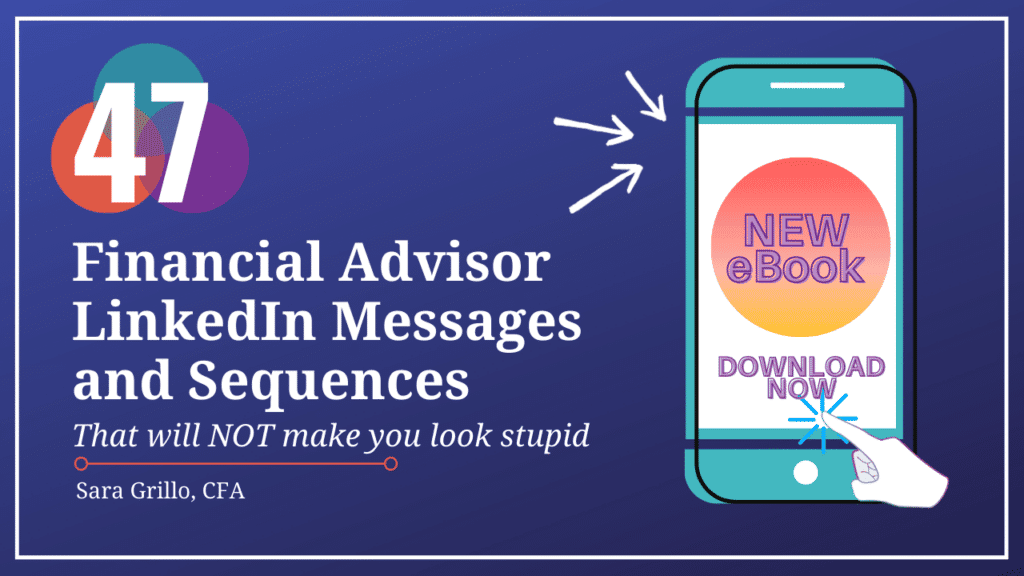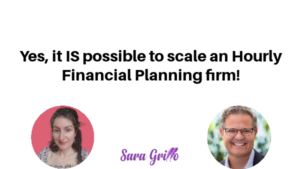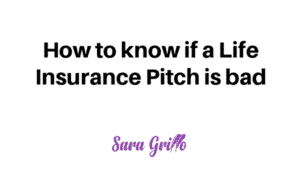Podcast: Play in new window | Download
How do you sell insurance and sound cool? It’s really harder to do than you would think. Any mention of insurance is typically enough to make clients want to run the other way.
How do you sell insurance the ethical way? That takes a bit of analytical prowess. Let’s talk about it!
Are you ready?
But first…
For those of you who are new to my blog/podcast, my name is Sara. I am a CFA® charterholder and I used to be a financial advisor. I have a weekly newsletter in which I talk about financial advisor lead generation topics which is best described as “fun and irreverent.” So please subscribe!
What to expect
In this episode of the Sara Grillo podcast, we are joined by Barry Flagg, CFP®, CLU, ChFC, GFS. Listeners will learn:
- How financial advisors can sell insurance by asking clients about the last, largest, most-neglected, and worst-performing asset on their balance sheets
- How to serve clients better by telling them the real story about their life insurance costs and relative value compared to other policies
- How to outservice the competition with higher integrity, transparency, and clarity about insurance
- How to use Prudent Investor principles to eliminate the competition still using misleading, inappropriate, and unreliable policy reviews
- How to get more referrals by clearly associating your brand with the “clients’ best interests” movement
- List of insurance prospecting questions to ask someone you are trying to sell insurance to
Life insurance sales question list
Here is a list of insurance prospecting questions I would ask if I were a financial advisor trying to sell life insurance to a prospect. We’ll discuss these and more in the podcast below.
- What is the cost of the insurance? (not premium, but COST)
- How is the cost of this insurance policy different from its premium?
- How does the insurance policy compare to others of its type in terms of performance?
- What benchmark are you using to assess the performance of this insurance policy?
- How does the cost of this insurance policy compare to the industry benchmark?
- Did an objective source provide you with the benchmark/peer group used for comparison of the policy and costs of this policy?
So now….for my podcast on how to sell insurance
0:00:01.2 SARA GRILLO: Hi everybody. Coming at you with an exciting topic, the cool way to talk about (and sell) life insurance, and I’m so excited to have my buddy Barry Flagg here with me, Barry is the founder of Veralytic, an independent life insurance research company.
Barry, it seems like you know an awful lot about the life insurance business, and I think the biggest question is here, how do you talk about (and sell) life insurance and sound cool. And it’s really harder to do than you would think. When I was in the business at one point before I had three children in three years… Literally, yes, folks I did that, I’m not lying. But before I did that to myself, I actually was an advisor at a life insurance company, I just remember people wanting to run in the other direction every time I opened my mouth about insurance and what was worse was some of the training tactics we were taught were just icky, sticky. So how do we create a new lingo in a new way and it will approach to how to sell life insurance, which is conceivably, there’s a lot of need for intelligence about this, it’s the last largest, most neglected and worst performing asset on everyone’s balance sheets for good news. Right. Tell me, Barry.
0:01:59.9 BARRY FLAGG: So I think you gotta talk about life insurance the way people talk about every other asset on their balance sheet, you don’t hear clients being hesitant to talk to their financial advisor about their mutual funds, or their private equity funds, or their hedge funds, and it’s because the client can actually have an intelligent conversation about them because they’re told what they’re being charged, they’re told what they’re getting in performance, they can cross-reference it with independent industry benchmarks. But life insurance costs are not disclosed at all, the performance is a hypothetical projection, never reported on what actually happened, and then the expectations that the client has about the life insurance never comes through.
0:03:12.0 SARA GRILLO: I wonder that this has even been able to survive as a product, a life insurance is a billion dollar industry, or whatever.
0:03:24.4 BARRY FLAGG: Show you how much it’s needed, it is an absolute essential product in the financial planning process, yet it has been really one that no one wants to talk about, which is why it’s the last largest, most neglected asset on their balance sheet.
0:03:40.5 SARA GRILLO: We… No, but okay, the consumer doesn’t wanna talk about it…
0:03:44.9 BARRY FLAGG: Correct. For the reasons, we were just talking about it, it is difficult for the consumer.
0:04:01.8 SARA GRILLO: Is it more emotional though?
0:04:06.9 BARRY FLAGG: I don’t think that’s the case anymore. I mean, I really don’t… I mean, people are buying more insurance online than ever before, the term insurance providers are advertising online more than ever before, they’re selling more insurance online than ever before. I grew up in an environment where one of the adage was life insurance can’t be bought, it has to be sold, and I just don’t think that’s true. If you give people the information they need to make a decision, they won’t hesitate to buy life insurance anymore (and it becomes easier to sell them the insurance)… what they’re actually being charged inside the policy and what they’re actually getting in performance so that they can have conversations about that over time, but that never happens it… It hasn’t happened. When I first got into the business, part of my motivation for creating Veralytic was that even if you knew what you were being charged, there was not an easy way to find out whether that was a fair price or not.
0:05:18.3 SARA GRILLO: To… I’ve been trying to buy whole life insurance for about five years now, and I just never get anywhere, because every time I talk to an agent, they’re like… They’re like, Oh yeah. These illustrations, right? And I’m like, man, can you guide me through this here? “This 3% I’m gonna make in the crediting rate, and then they’re like, Oh, if you want something more aggressive, then let’s talk about universal life.” I’m an MBA and the whole thing and I can’t understand what people are talking about when they try to sell me insurance. I just have been unable to do this successfully myself as a consumer, to everyone listening to this show, I don’t wanna be contacted about insurance… Don’t pitch me and don’t try to sell me any insurance.
0:06:30.7 BARRY FLAGG: When someone shows you a premium, that premium is not the cost of the whole life policy any more than the 7000 or 14000 or whatever you put into your 401k. That’s not the cost of the 401k. The cost is what they take out of your 401k contribution, and the cost is what they take out of your whole life policy, but I’m guessing no one’s told you what that actually is in their proposal, so if somebody told you, You know, here’s the hypothetical projection. Here’s what we think is. I think you can expect… And by the way, here’s what you’re being charged, here’s how it relates, here’s how these costs relate to industry benchmarks, they’re lower than industry benchmarks, here’s… This illustration shows the hypothetical forward-looking performance, but here are the actual historical performance, and here is, again, a measurement against industry benchmark that says that this carrier has performed better than their peer group. So now, if this was any other asset and you were given the cost that you’re being charged, whether those costs are fair or not, the rate of return that’s reasonable to expect relative to the risk you’re willing to take, and the fact that the performance is better than their peer group, now all of a sudden, at least, by my way of thinking, you can make an informed decision.
0:08:09.2 SARA GRILLO: But okay, then it becomes the game of chicken where it’s like, but who wants to be the first person to do that? Because let’s say how I go out there and say, I go there, okay, this is what it’s really gonna cost you, this is my performance of this carrier versus industry benchmarks, but then you got the next advisor that’s out there saying, let’s have a steak dinner, and by the way, you can be a member of this little luxury club we have, and you can go on a cruise with all the rest of my rich clients. And you see what I’m saying. So it’s a little bit like, Who wants to be the first one? This is how people are selling life insurance
0:08:50.7 BARRY FLAGG: In fairness to the financial advisors, they couldn’t do this in the same way that it was darn difficult in the early days to actually… To measure the fund management fees of a particular fund against all funds, it was just darn difficult before something like Morningstar started, changed all that. Well, back when I was doing it, you’d look it up in a book for any of your listeners that are my age or older, they’ll remember the Principia Pro Books, but now you look it up online the same way, prior to the invention of Veralytic in 2003, when we went on line in 2003, it was darn difficult to find out what you were being charged and if it was fair, but nowadays, in a matter of minutes, a lot less time than we’re talking here, you can find out what you’re being charged and whether that’s a competitive cost relative to the entire universe of alternatives.
0:10:41.6 SARA GRILLO: Let’s say I’m a fee-only firm and I’m getting a stay to myself, okay, I’m gonna find a cool way to sell life insurance, and I’m gonna just do this. Okay, so how would I go about doing that?
0:11:12.9 BARRY FLAGG: Yeah, so you’re managing money for clients, you’re providing them with the fees that they’re being charged on their investments, the performance of their investments. So you take the same approach, the approach that makes this conversation… Cool, you take the same approach for life insurance, the easiest way to do it is to work with a Veralytic-certified BGA. So, the broker-dealers help financial advisors with certain types of investments, a BGA is the broker-dealer version for life insurance distribution. So you work with a Veralytic-certified BGA who can provide you with the search for best available rates and terms using the Veralytic system instead of having to do it all on your own. If you had to do it all on your own, you’d request the illustrations from your favorite BGA if they’re not Veralytic-certified, and then you’d have to run a Veralytic report on it to know whether or not the cost being charged inside that illustration are competitive or not.
0:12:30.3 SARA GRILLO: Okay, that’s the process for me actually doing the research and figuring out what to pitch, okay. How are you gonna give me talking points for when I go and speak with my clients about this…
0:12:44.6 BARRY FLAGG: The benefit, the blessing of a patent is the government grant a monopoly, the curse of a patent is no one knows how to use it, so all of our subscribers… I spend time with all of our subscribers over the phone until they’re up and running using verily reports, how to talk to them about… How to talk to them about clients, what not to talk about, just like my experience in my early days, Morningstar reports include a lot of information. Not every data point in a Morningstar report is relevant to every client situation, so yes, we go through the Talking Points with new subscribers, what to say, what not to say, and if they come across a situation that they hadn’t come across before and have questions.
0:13:57.5 SARA GRILLO: Half of the insurance community out there is probably gonna have my head.
0:14:07.2 BARRY FLAGG: The other half are gonna thank you endlessly, because in fact, I tell you, and I get the same experience, I spoke at FPA, the FPA annual meeting this past year, spoke it not for the last two years, and I think I’m gonna speak again next year, financial advisors are thirsty for the talking points and the data to be able to actually advise clients about their life insurance instead of this kind veiled advice sales pitch for particular types of products, but from the main stage, I’ll ask “Who in here started in the insurance business and ended up in the investment business, and why”… And half of the people in the room will say, “We went to the investment business because the insurance business was icky and the investment biz was cool.” And so then I spend the next hour talking about how to have that cool conversation about life insurance, and invariably, when I get my speaker evaluation, half of the people in the room or life insurance guys who send me nasty comments and the other hand… Yeah, exactly, and the other half, send me handsigned notes for, “Hey, so glad that there is now this tool out there that can help me advise clients about life insurance the same way I’ve been advising about everything else for 20 years.”
0:15:32.8 SARA GRILLO: Because you know something, it really can really help you because you go out there, you need term insurance, and inevitably the rep doesn’t wanna sell your term life insurance because that’s a $200 commission. When I bought mine, it’s like you can get a million a term for what, like 50 bucks a month, that’s a 2000 commission to the life insurance agent. That’s almost not even worth the time. For the initial meeting, right? Let’s be real.
0:16:02.8 BARRY FLAGG: If you’re in the business of selling insurance… That’s totally correct. If you’re in an advice business, then it figures into your revenue a different way, but… Yes, I totally understand your point about the salesman part of the business, sales people part of the business.
0:16:23.5 SARA GRILLO: In… So you really have to sell a whole life policy, unless you’re selling huge term life insurance policies… And I just remember when I was an advisor going out there and I would talk with people, and they’d be like, Well, I don’t know, I already have my policy with this other carrier, and it was like… I didn’t know what to say at that point. Okay, look, what am I gonna say?
0:17:30.2 BARRY FLAGG: Well, Adam Smith would describe a efficient market as a market where the price between one version of a product in the version of product is relatively narrow and it’s based on quality or service. Right. But he also says that The… An essential ingredient for an efficient market is the free flow of information, so that the invisible hand of the consumer can choose good pricing from bad pricing, right, and then by not choosing the bad price as the bad pricing goes away, and by choosing the good pricing to that makes the vendors of the good pricing do more business, and they do more good pricing in a marketplace where costs are obfuscated, the invisible hand of the consumer, can’t choose… In fact, I’ll tell you a story from my advisory days, I had a meeting with a car dealer owned multiple dealerships, anybody in your audience who’s ever dealt with car dealers, not the average affluent loans car dealerships, they are high net worth or ultra high net worth individuals, and he had life insurance that he bought from this property and casualty insurance company, and we got to talking about it and I said, Well, what are you being charged?
0:19:10.7 BARRY FLAGG: And he says, I have no idea. I don’t know what you mean. So we ran a Veralytic report, found out when he was being charged, he was being charged… I kid you not, he was being charged 80% more than best available rates and terms. And I said to him, or he said to me, “It can’t be right. It just can’t be right. There’s no way that this insurance company who treats me very well, there’s no way they’re gauging me that way,” and I said, “David, you’re an ultra high net worth individuals. I met with your CPA, I met with your tax attorney, and you surround yourself with advisors, you are one of the most capable buyer or financial products on the planet, right?” And he says, “I guess so.” And I said, “So as one of the most capable buyers of financial products on the planet, you didn’t know what you’re being charged, did you… ” And I say and your CPA didn’t know what you’re being charged in… He says No. And I said, Your attorney didn’t know. And he says, No. I said, So, if you were a manufacturer of a product, I don’t care about product forget life insurance, if you were a manufacturer of a product, and you know that the most sophisticated buyers of your products wouldn’t know what you were being charged, and I wouldn’t even ask how much would you charge? What do you think? Well, anything I want…
0:20:55.0 BARRY FLAGG: So the fact of the matter is that it is a regulated industry, so they can’t charge anything they want, but there are 10000 different pricing combinations permutations for every single product, there’s a different price for every age, there’s a different price for males versus females, there’s a different price for smokers, non-smokers in some cases, never smokers, so there’s 10000 different prices, and the prices are without the invisible hand of the consumer choosing good pricing from bad, prices are all over the board, as much as 80% difference between good and bad pressure…
0:21:31.8 SARA GRILLO: Alright, very. So you’ve mentioned before the prudent investor principles, this is something all of us that are calling ourselves fiduciaries, which it seems like every advisor, whether or not they are actually fiduciaries who… Fiduciaries, but that’s beside the point. See my snarky blogs where I’ve written about the abuse of that term. How can we use these pro-investor principles to smash and bash the offenders?
0:22:29.3 BARRY FLAGG: There is no asset on the client’s balance sheet where it is easier to demonstrate a fiduciary advisor from a non-fiduciary advisor or a sales person, the fiduciary… One of the core principles of a fit of fiduciary behavior is the duty to exercise reasonable care, skill and caution, and if an advisor has worked with a client, but the client purchased insurance from somebody else, all you need to do is have a conversation with them about Okay, so how did you make that decision? While the broker working with showed me a couple of these illustrations, and we picked the one that had the lowest premium, so a fiduciary who has a duty to exercise reasonable care, skill and caution would say, Well, wait a minute, I can’t rely on something that’s misleading, fundamentally in appropriate unreliable… So let me help you, instead of decisions that were made on misleading, fundamentally appropriate liable information, let me help you look at what the costs are actually being charged in this policy, what’s the performance you’re actually getting relative to both your original expectations and relative to peer group alternatives, and that’s the… I think it’s the easiest conversation to open up of any client, easiest conversation to have to demonstrate the difference between a fiduciary advice versus non-fiduciary advice in this day and age where everybody is using fiduciary is a marketing term, but doesn’t have the operating pillars to back it up.
0:24:58.8 SARA GRILLO: Okay, and then what about getting referrals from this, with associating your brand with the best interests of the clients type of movement.
0:25:12.7 BARRY FLAGG: I also see that among my subscribers, I’ll tell you a story that I won’t say is representative every single time, but it’s representative and concept, one of our subscribers was a long time… A financial advisor in the Dallas area, been there 20-30 years. There was an attorney in town who represented the uber wealthy in Dallas, he could never get a meeting with him, and so he calls him up and says, Look, I don’t wanna talk to you about life insurance, but I wanna talk to you about life research or life insurance analysis. So the attorney takes the meeting and Todd goes through the report with the attorney, and the attorney says, I’ve been… I promise, this is a nearly direct quote, The attorney says, I’ve been looking for this all my life.
0:26:55.5 SARA GRILLO: Right. Okay, alright there. So we’ve been on here for a while, thank you so much for your time. So I like to end… Podcasts I do, and I don’t always remember this, but nobody’s perfect with three takeaways that people can implement immediately, so Barry, three things advisors can do to talk about insurance in a cool way, like the 2014 Boston Red Sox that won the World Championship. Worries out there. Yeah, I know, I live in New York and I even both just still remember and say These things all the time, so Barry, go.
0:27:39.5 BARRY FLAGG: So three takeaways, I would absolutely positively ask clients if they know what they’re being charged in their life insurance, they don’t, but it’s a great way to start the conversation, and if they tell you they know and they answer it with the amount of the premium, just to have that conversation about the cost is not the premium, the cost is what’s being deducted from your premiums or what’s being deductive from your cash values. 99.999% of the time they don’t know. Brand your practice in this age where there is something in the media, both in the advisor oriented media and consumer-oriented media, there’s something about fiduciary, there was something about client’s best interest, this is a conversation that’s gonna continue to be a top topic, to align your brand with client’s best interest, and talk about how… You’re probably… The client is probably already getting a prudent investor principal treatment from any other assess their balance sheet, but life insurance is this asset that it’s just not getting Prudent Investor principal treatment, so it is so easy to brand your firm as a client’s best interest firm. When you talk about life insurance, by doing the things we talked about this morning, and then we also talked about referrals, advisors, CPAs, tax attorney, CFA, CFPs, they’re all fiduciaries.
0:29:14.9 BARRY FLAGG: And so if you talk about life insurance using their language instead of the life insurance industry language, I guarantee you’ll get more referrals.
0:29:24.9 SARA GRILLO: Alright, thanks very. This was great, welcome. So yeah, everybody make sure you check out Veralytic, and also more importantly, folks, I just want to also mention, just like Barry has the subscription service, I recently started as well, a subscription service of my own, where financial advisors can get social media marketing tips, there’s three instructional training videos a month demonstrating LinkedIn and other social media techniques, and as well, you get one webinar for members only and access to my members only LinkedIn group, which is online coaching on demand. So everybody check that out. And by the way, on the way, please rate, subscribe and review this podcast. Thanks, everybody for listening once again.
Sara’s upshot on how to sell insurance
What’d ya think of my podcast on how to sell insurance? Was this helpful?
If yes…
Learn what to say to prospects on social media messenger apps without sounding like a washing machine salesperson. This e-book contains 47 financial advisor LinkedIn messages, sequences, and scripts, and they are all two sentences or less.

You could also consider my financial advisor social media membership which teaches financial advisors how to get new clients and leads from LinkedIn.

Thanks for reading. I hope you’ll at least join my weekly newsletter about financial advisor lead generation.
See you in the next one!
-Sara G
About Barry D. Flagg, CFP®, CLU, ChFC, GFS
Barry D. Flagg is the inventor and founder of Veralytic®, Inc., the only patented online publisher of life insurance pricing and performance research and product suitability ratings. Veralytic is the product of his unique background as both the oldest youngest CERTIFIED FINANCIAL PLANNER™* first schooled in the investment business, as well as a life insurance practitioner consistently ranked in the top 1% of the industry. His experience in both financial product analysis, life insurance sales and marketing, and his success in managing large life insurance portfolios for affluent individuals and growth companies, brings an unparalleled advantage to his presentations.
Podcast writeup adapted from original wording for editorial purposes







